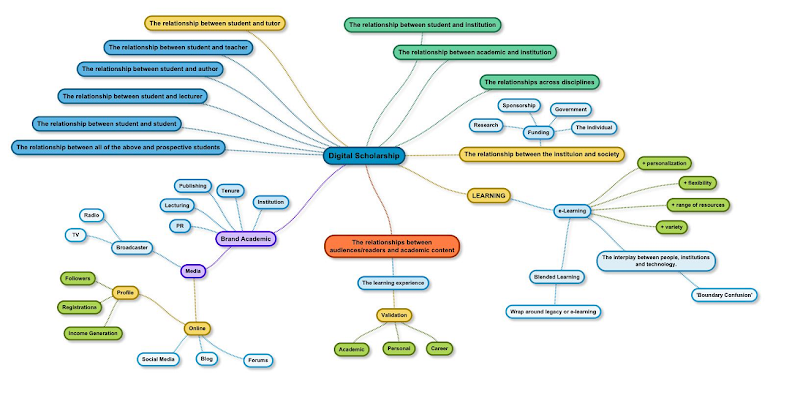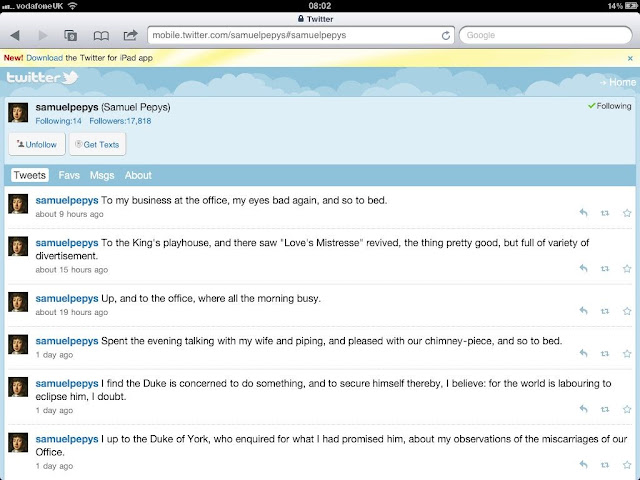Martin Weller (2011)
INTRODUCTION
Introduced to the power of blogging by John Naughton
(Worth following in the Guardian. Surely a demonstration of how academics blur the line between academic and journalistic writing styles successfully, just as Weller intimates that students will have to learn to differentiate between social networking writing styles and the academic style of an assignment, paper or thesis?)
· Explain things in depth
· Give all sides to the argument
· Why academics can't do the elevator pitch
The Digital Scholar was written through a blog to explore the advent of new technologies.
Wrote his last book on VLEs in 2004.
(By coincidence I am using it to prop up the iPad)
- Online databases
- Searching
- Bookmarks from Delicious
- Google Reader
- cited posts from blogs, but not only text, also video.
Blogging for around five years
Also keeps a scrapbook like blog in Tumblr.
(I’ve used Flickr, and Tumblr, even Kodak Gallery in its time. Now I put everything into Picasa Web. The 250 grabs, charts and images are open to share. Dion Hinchcliffe offers his social media diagrams free as separate assets in Flickr River).
- A way to offer drafts to ask for feedback
- Sharing resources
- Working in an intellectually vibrant environment
- Google alerts providing updates on key words
- Keeping abreast of the field
- Declining attendance of conferences
‘With special thanks to’
By sharing content online I believe I may finally find my own way to publication.
Many of these services did not exist or were in their infancy in 2004.
Blogs in particular
A book
There significant changes:
1) The quantity of information available - all digital compared
2) 3000 on Twitter, 2000 subscribe to his blog
Appeals
Distributed, global resource to contemporary issues, puss of new technologies,
contributions by video and audio
3) The richness and range of contributions to include blogs, comments and
debate, video and conferences.
A shift I attitude to the legitimacy of these contributions.
Both a physical object and complementary material.
Grainne Conole using cloudworks.
Another posting a weekly video to encourage debate.
Concept of scholarship
Suffiently broad term, not only teaching and research,
not just engaged in research and employed by universities.
In a digital
Someone who employs digital and open technologies in a particular field.
Bloggers link to each other, democratic and easy to set up.
Epitomy of the kind
of technlogy that results in innovation.
Read or unread, daily or months,
specialist or generalist.
How do we recognise talent?
Should people separate out that academic and informal lives?
· Quantity
· Role of social networks
· Range of resources
Transformation of practice
All scholars are digital if they use a word processor and PowerPoint. But this
is 'business as usual'.
1) Digital
All digital files and shared by the same method.
2) Networked, nor longer isolated.
Easy distribution VS restriction of
scholarship to libraries, conferences, lectures and seminars. Once digitised the
barriers come down.
Dunbar. Friends 150. Reinforce with interaction. Online with a wide group of
peers.
3) Openness
Tim O'Reilly 2004 the architecture of participation.
Finely worked material of the journal, compared to seeing where things will lead
by sharing.
Digital, Networked, Open.
E.g collaboration between two people (Frank & Sally)
The value of a person's individual network for distribution.
The collaboration of two academics sharing their outputs they go along ... Just
a shift?
Collective impact changes everything.
Fast, cheap and out of control.
Brian Lamb. 1970 documentary. intersection of
all three is significant to education.
Fast to write and set up, no need for central services.
Cheap tools that have a premium, no need to turn to a budget holder.
Out of control. Outside normal institutional controls.
Money/payment and the need to persist with a certain system.
Student record systems need to be robust.
The good enough revolution. Wired (2009)
E.g. Flip video ... Cheap, fast and everywhere.
Dinky, lower power technology that is just good enough.
VS. Dystopian and Utopian points of view.
VS. Technological determination - humans controlled by the kit, rather than the
kit controlling the people.
Unpredictable
Taking something and using it in a way never imagined
E.g. Flickr started as a game that used photo sharing.
Social construction of technology
Complex process of co-construction
Adoption of new technology is changing scholarship. Boyer 1990
1) Context
2) Evidence
3) Other industry changes in music and newspapers
4) Boyer 1990 scholarship discovery, integration, practice, application,
teaching
*
*
*
*
9) How digital scholarship may change teaching
10) Analogy of networked weather - you can't help but be touched by it.
Digital
Networked
Open
New publishing and conferencing
13) adoption
14) anxieties
Education
1
2
3) Irrelevant
Not peripheral, or an issue to resolve, but rather changes to society ... As
John Seely Brown.
VS. Suggestions that our students have changed and cites Marc Prensky.
Separating myths from the hype.
What are the solid foundations.
A truism regarding exposure to computers. Prensky 5,000 books, 10,000 digital,
20,000 TV US
75% of 9-19 have access to a computer at home UK
72% South Africa
To get information
To research say on personal health
Oblinger and oblinger
Livingstone
Net Gen disappointed
Gen X against pointless interaction in class and kind of connection online.
Cannot correlate truancy to educational irrelevance.
net Gens more likely to be disappointed by how tech is used.
Net gens differentiate between writing to socialise compared to writing for
school.
Those who like writing and have an aptitude are more likely to blog so no point
in getting those with poor writing skills to blog.
A good deal of variance.
Brown 2009.
Teens poor performance, low patience, poor
reading and poor research skills.
· Express themselves in personal language
· Just print off
· Visiting a narrow range of sites
· Don't question its reliability
· 21% blogs
The net Gen literature sees difference where none exists.
- Older gens did homework in front of TV
- Did a previous gen have an ambiguous view.
- Similar angst amongst students in 1908, 1960s and now. Unable to show causality.
- Differences between net gen students and general public. Differences are not
- significant.
- General decline in literature reading.
Bennett et al (2008) not net Gen difference.
18-22 students outnumbered by mature students in the US.
Google, Dec 2009.
87 billion of 131 billion searches.
55.6 million in 2007 to Wikipedia
Facebook, 500m, 130 friends, once a day
YouTube, in June 2008, content 91 viewers in 2008
Significant activity online across a range of society.
Future liberation of topics.
Griffiths (2008) graffiti artists share and behave in a way that educationalists
would design into a programme of learning, and so it is with many other topics,
on or off the curriculum, formal or informal, from knitting to physics.
Learn as the key motivational desire.
Physics 100,000
FLOSS communities
Demonstrates many of the characteristics:
Mentoring
Communities of practice
Learning by doing
Self directed learning
Communities can form that would have previously been unable to do so due to
geographical and other barriers.
Openness in education - shift driven by technology.
Make academic papers open.
Broader trend and philosophy of the Internet.
Web 2.0
Top 10
Public or semi-public sharing of personal information
MIT Open 2002
1 million visitors
132 million tertiary students worldwide in 2004
OU 3 million within 2 years and helped recruit students to courses 7,000.
Slideshare
More traffic than MIT
Several hundred years to create the lecture Based models
Using third party content in their lectures.
How do universities remain relevant to society?
Apple to iTunes
Guardian to Podcasts
Stephen Downes 10,000 hits per day (video)
Boundaries between sectors less clear-cut
Some perfect storm ... Convenient for some to see. The Net Gen literature is
exaggerated, overblown, HE is not about to face a tectonic shift.
Firm evidence of benefits and that it is necessary.
Critical mass
Ubiquity
Invisibility
Brown
2007 those using social networks in the minority, now in the majority.
Give students relevant skills.
Asses which of these technologies will be significant.
Why do Students choose a university?
Not because of the technology used.
Core suitability
Academic reputation
Jobs
Teaching qualities
Non-academic reasons:
Proximity to homes
Scholarships
Non academic services
Cost of living in the uni area
Job prospects (while studying)


